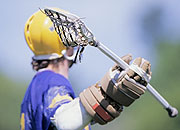- Could Your Grocery Store Meat Be Causing Recurring UTIs?
- Are You Making This Expensive Thermostat Error This Winter?
- Recognizing the Signs of Hypothyroidism
- 10 Strategies to Overcome Insomnia
- Could Artificial Sweeteners Be Aging the Brain Faster?
- Techniques for Soothing Your Nervous System
- Does the Water in Your House Smell Funny? Here’s Why
- Can a Daily Dose of Apple Cider Vinegar Actually Aid Weight Loss?
- 6 Health Beverages That Can Actually Spike Your Blood Sugar
- Treatment Options for Social Anxiety Disorder
Helping Student-Athletes With Mental Health Issues


Guidelines for helping U.S. high school athletes with mental health problems are outlined in a new policy statement from the National Athletic Trainers’ Association.
The types, severity and percentages of mental illnesses are growing in young adults aged 18 to 25, and may well start before or during adolescence, the association says.
“The purpose of this statement is to raise awareness and provide education for the high school athletic trainer, coach, administrator, guidance counselor and parent on the prevalence of mental health issues in secondary school athletes,” said Tim Neal, chair of the task force that developed the recommendations.
“We have created a road map on how to better recognize potential mental health issues and develop a referral system to provide the athlete with assistance,” Neal said in an association news release.
The task force was led by the athletic trainers’ association and supported by other groups, including the American Academy of Pediatrics, American Medical Society for Sports Medicine and American Psychological Association.
More than 7.7 million American high school students play organized school sports each year, according to the news release.
Possible triggers of mental health problems in high school athletes include poor sports performance, career-ending injury, academic pressure, an eating disorder, and bullying or hazing, the statement says.
Along with outlining ways to identify and get counseling or emergency assistance for student athletes with mental health issues, the statement also offers advice about confidentiality and legal issues.
The statement, released Monday at the Youth Sports Safety Summit in Dallas, was published simultaneously in the Journal of Athletic Training.
According to the statement, about one-fifth of high school students with depression and other mental health problems report high rates of alcohol abuse.
Also, 58 percent of 13- to 17-year-olds say they’ve experienced problems such as loss of a parent, economic hardship or abuse. And 86 percent of high school students say that some classmates drink, smoke or use drugs during the school day, the statement says.
More information
The U.S. National Library of Medicine has more about teen mental health.
Source: HealthDay
Copyright © 2026 HealthDay. All rights reserved.










